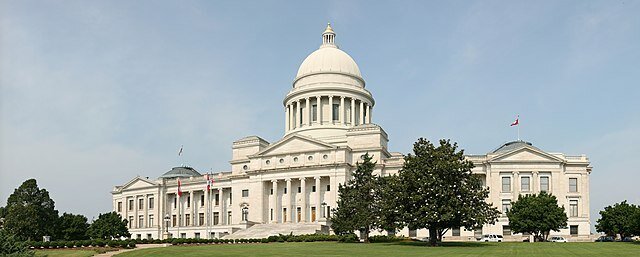- Arkansas lawmakers delayed the launch of mobile sportsbooks until after the Super Bowl.
- Rule change proposed by state Racing Committee would allow up to eight mobile sportsbooks.
- Proposed rule would require local casinos be the dominate partner, not the national sportsbook operator.
3 Minute Read
Arkansas basketball fans hope to be able to place mobile wagers during March Madness. (AP Photo/Michael Woods)
Despite an effort to launch mobile Arkansas sports betting statewide in time for the Super Bowl, the start of wagering is now delayed. Political gridlock and possibly last-minute maneuvering by industry insiders appear to be the reasons the state will miss out on the single largest betting event of the year.
A rule change by the Arkansas Racing Commission only needed approval from a legislative subcommittee to allow mobile sportsbooks. However, a few lawmakers have decided to slow the process down for a more thorough review.
Why Is Mobile Arkansas Sports Betting Not Launching?
The Arkansas Legislative Council had added the new mobile sports betting rule to its agenda for this week’s meeting. However, at the last minute the item was pulled from the schedule.

Lawmakers at the Capitol in Little Rock have delayed the start of mobile Arkansas sports betting.
The Legislative Council is a subcommittee of Arkansas state lawmakers and needed to approve the Racing Commission’s proposed rule change before it could take effect. Before the meeting, one word of the proposed new rule was changed, with “revenue” becoming “receipt.” Effectively, this change had no impact, as “receipt” only seems to be the preferred language for legislation and rules.
But legislative concerns still led to the rule being pulled from this week’s meeting. The vague excuse from lawmakers may mean they are under pressure from the sportsbook industry to change the rule more drastically.
Rule Change Would Require Proceeds Stay in Arkansas
Arkansas already allows sports betting. There are in-person retail sportsbooks at each of the state’s casinos. However, the new mobile betting rule proposed by the Racing Commission would set Arkansas apart from almost all other states with regulated mobile betting.
On top of taxing sportsbook revenues, the Racing Commission’s rule would require at least 51% of the proceeds from sportsbook “receipts” be retained by the casinos. Typically, local casinos have partnered with a national sportsbook brand to offer mobile betting elsewhere.
In those cases, the proceeds split ends up with the local casino retaining 5%-15% of the proceeds, while the national betting platform retains the rest. There would be up to eight mobile sportsbooks allowed in Arkansas, with each casino being allowed to partner with two operators.
Seemingly, the national sportsbook operators are pushing back against the proposed rule through behind the scenes lobbying. New York’s new mobile betting has a tax rate of 51% but this is different from Arkansas’ proposal. Arkansas state funds would receive a lower amount of taxes, but its local casino operations would profit handsomely from the arrangement. As more states regulate mobile sports betting, look for rules to begin to tilt more towards local governments and businesses. In that way, Arkansas may be a trend-setter. Just not before the Super Bowl.






